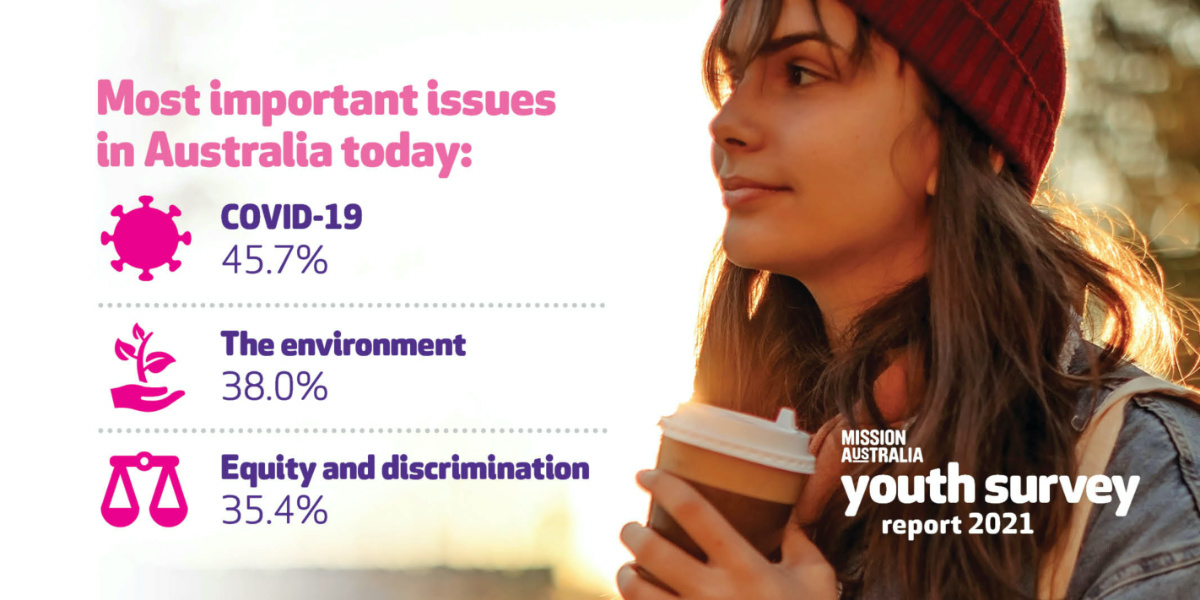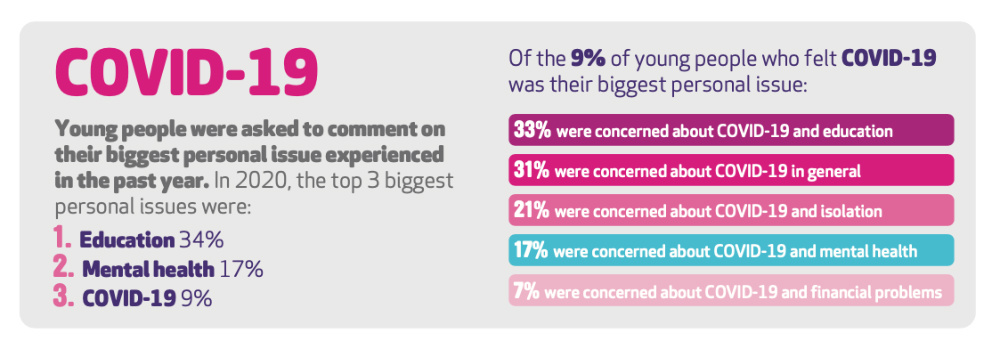Sydney, Australia
Australian youth are most concerned about COVID-19, the environment, and equity and discrimination, the annual Mission Australia Youth Survey for 2021 shows.
Young people aged 15 to 19 are also personally concerned about coping with stress, mental health, and school or study problems, followed by body image and COVID-19, the report, released on 1st December, shows.
However, the survey showed while young Australians are worried about many of the major issues of the day, the majority (53.4 per cent) indicated overall happiness with their lives.

GRAPHIC: Courtesy of Mission Australia
Now in its 20th year, Mission Australia questioned 20,207 teenagers around the country between April and August to “identify the values, aspirations and issues of concern to young people”.
Mission Australia CEO James Toomey said young people continue to voice their concerns and articulate their awareness of and concerns about social issues affecting themselves and their country.
Toomey said they feel Australia must address their top three issues of concern for 2021, being COVID-19 (45.7 per cent), the environment (38 per cent) and equity and discrimination (35.4 per cent).
“Young people are showing they’re aware of and care about social and personal issues affecting themselves, their peers and their country. Listening to and acting on these crucial insights has always been vital and is now more pressing than ever as we round out our second year of COVID-19 pandemic challenges,” he said in a statement.
“Now is a critical time to make sure young people are heard. Young people can and should create and advise on solutions that will address issues that affect them, other young people, and Australia. The Youth Survey is just one way of capturing the voices of young people, but they are telling us that they want to feel heard in political and decision- making processes.
“These responses are given in the context of a crescendo of public dialogue accompanying national and international events such as COVID-19 lockdowns and outbreak responses, climate change campaigns, extreme weather events such as bushfires, drought and floods, and the Black Lives Matter movement.”
Toomey said young people’s comments within the report showed climate change is “taking a psychological toll on young people across Australia”.
One respondent from Queensland spoke about her state of mind and lack of faith in humanity to respond to the challenges of climate change.
“I’ve felt very depressed about the future of the Earth. I have lost a lot of faith in humanity, and feel like nothing is being done (or very little, very slowly) to reduce the effect of climate change,” the 15-year-old (non- Indigenous) girl said.
Her opinion was echoed by others, including a 16-year-old person from New South Wales who identified as non-binary and who was quoted in the report as saying, “every problem we face, not just as Australians but as citizens of Earth, can be linked back to discrimination and climate change”.
“We must take action to not only acknowledge Australia’s casual racism and complete lack of action against climate change but to take action and implement initiatives and legislation that will require us to do something about these problems. We cannot continue to treat our fellow human beings so poorly, we must call ourselves on our dreadful behaviour and work to improve. We have no future without a habitable planet,” they said.
We rely on our readers to fund Sight's work - become a financial supporter today!
For more information, head to our Subscriber's page.
For another student in South Australia, Aboriginal deaths in custody was of importance too.
“Issues like the inequalities and deaths in custody that Aboriginal and Torres Strait Islander people face, as well as governmental inaction on climate change have concerned me,” the 16-year-old non-Indigenous youth said.
On a personal level, the top three issues of concern for young people were coping with stress, with close to half (46 per cent) indicating they were extremely or very concerned about the issue, 41.9 per cent extremely or very concerned about mental health, and 36.8 per cent feeling the same way about school or study problems.
On a national level, more than one third (34.6 per cent) of young people identified mental health as an issue, with more females (39 per cent) saying it was important, compared with 30.1 per cent of gender diverse respondents and 29.6 per cent of males.

Meanwhile, equity and discrimination was again in the “top three issues of national concern” with 35.4 per cent of young people agreeing it was a problem, up from 24.8 per cent in 2019.
As well, 34.2 per cent of respondents reported experiencing unfair treatment themselves in the past year, an increase from the 27 per cent of respondents reporting unfair treatment in 2020.
“Higher proportions of gender diverse young people reported being unfairly treated (69.9 per cent compared with 38.3 per cent of females and 25.3 per cent of males),” the report found.
“Close to half (47.1 per cent) of Aboriginal and Torres Strait Islander young people experienced unfair treatment.”
Among other findings, more than two-thirds of respondents (67.4 per cent) said they exercised for fewer than seven hours per week, while over half (55.9 per cent) spent two or more hours on screens for entertainment per day.
The report summary said the findings were a reminder that diversity “has to be specifically recognised and included in the development of strategies, programs and policies for young people”.
“It is incumbent on us all – governments, health professionals, community services, businesses, schools, members of the community – to create welcoming environments that are responsive to the needs of all young people, whatever their background and circumstances.
Young people need to be at the centre of policy and service design and development, to bring their unique perspective to bear on issues that affect them and on the development of solutions.”






